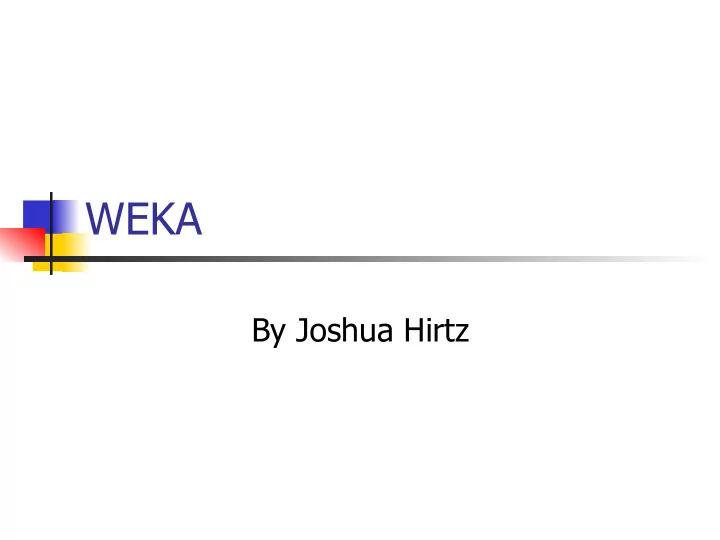

WEKA By Joshua Hirtz
Introduction n History n Examples n Objectives n Problems n Features n SPSS Comparison n Dataset n Overview
History n Waikato Environment for Knowledge Analysis a.k.a. (WEKA) n Created in New Zealand by the University of New Zealand ’ s Computer Science Department
History (Cont.) n Current versions n The book version is currently locked in 3-4 so that is may stay constant with the book n The developer version is currently in 3-5
Objectives n Our objectives are to n make ML techniques generally available; n apply them to practical problems that matter to New Zealand industry; n develop new machine learning algorithms and give them to the world; n contribute to a theoretical framework for the field. Taken from http:// www.cs.waikato.ac.nz/~ml/ index.html
Features n CLI – offers a simple Weka shell with separated commandline and output. n Explorer – an easy to use graphical user interface that harnesses the power of the Weka software. Taken from http:// weka.sourceforge.net/wekadoc/ index.php/
Features (Cont.) n Experimenter – enables the user to create, run, modify, and analyse experiments in a more convenient manner than is possible when processing the schemes individually. n Knowledge flow - an alternative to the Explorer as a graphical front end to WEKA ’ s core algorithms. Taken from http:// weka.sourceforge.net/wekadoc/ index.php/
Dataset n Uses the .arff extension n @RELATION name – denotes the name of the file n @ATTRIBUTE name type – denotes the name of the attribute n type consists of numeric, nominal, string, and date
Dataset (Cont.) n @DATA – denotes the beginning of the data n data,data,data – data is then entered with attributes separated by commas and different instances separated by lines
Dataset (Example) @RELATION iris @ATTRIBUTE sepallength REAL @ATTRIBUTE sepalwidth REAL @ATTRIBUTE petallength REAL @ATTRIBUTE petalwidth REAL @ATTRIBUTE class {Iris-setosa,Iris-versicolor,Iris-virginica} @DATA 5.1,3.5,1.4,0.2,Iris-setosa 4.9,3.0,1.4,0.2,Iris-setosa 4.7,3.2,1.3,0.2,Iris-setosa 4.6,3.1,1.5,0.2,Iris-setosa 5.0,3.6,1.4,0.2,Iris-setosa
Examples n A quick example with the Explorer and KnowledgeFlow to show how they work.
Problems n Large datasets cause problems n Data needs to be in main data for traditional algorithms.
SPSS Comparison n WEKA n SPSS – Clementine n GPU – General Public n Expensive License n Created to handle n Problems with large large datasets datasets n Comes in various n Comes in a book and versions to cover developer version various environments n Base, Server, Batch, etc.
SPSS Comparison (Conclusion) n WEKA is a cheaper solution for smaller datasets, however it lacks seems to lack the power, customer support, and system flexibility of SPSS Clementine.
Overview n History n Examples n Objectives n Problems n Features n SPSS Comparison n Dataset
References Collaborated with John Aleshunas. n Weka Machine Learning Project . (N.A.). Retrieved May 6, n 2008, from http://www.cs.waikato.ac.nz/~ml/index.html WEKA (Machine Learning) . (May 3, 2008). Retrieved May 6, n 2008, from http://en.wikipedia.org/wiki/WEKA Frank, Eibe. (N.A.). Machine Learning with WEKA. Retrieved n May 6, 2008, from http://www.cs.waikato.ac.nz/ml/weka/
References (Cont.) Pfahringer, Bernhard. (N.A.). Machine Learning with WEKA. n Retrieved May 6, 2008, from http://www.cs.waikato.ac.nz/ml/weka/ N.A. (N.A.). WEKA: Machine Learning and Data Mining as n ClickandPlay. Retrieved May 6, 2008, from http://www.google.com/search?q=cache:MeH2vRZYZ5EJ: www.informatik.uni-freiburg.de/~mlpult/slides/WEKA- 1201.pdf+weka+pros+and+cons&hl=en&ct=clnk&cd=7&gl =us Jakob, Michal. (N.A.). WEKA: Machine Learning & n Softcomputing. Retrieved May 6, 2008, from http://www.google.com/search?q=cache:dSWjfexxIDcJ:cy ber.felk.cvut.cz/gerstner/teaching/ppdm/weka_lecture.ppt +weka+pros+and+cons&hl=en&ct=clnk&cd=6&gl=us
References (Cont.) Scope Creep . (April 28, 2008). Retrieved May 6, 2008, from n http://en.wikipedia.org/wiki/Functionality_creep Assessing Student Proficiency in a Reading Tutor that Listens . n (N.A.). Retrieved May 6, 2008, from h ttp://www.cs.cmu.edu/~listen/pdfs/UM2003_paper_test_pr ediction.pdf en:SimpleCLI (3.5.6) . (June 4, 2007). Retrieved May 6, 2008, n from http://weka.sourceforge.net/wekadoc/index.php/en:Simple _CLI_%283.5.6%29
References en:Explorer (3.5.6) . (June 4, 2007). Retrieved May 6, 2008, n from http://weka.sourceforge.net/wekadoc/index.php/en:Explor er_%283.5.6%29 en:Experimenter – Standard Experiments (3.5.6) . (February 25, n 2008). Retrieved May 6, 2008, from http://weka.sourceforge.net/wekadoc/index.php/en:Experi menter_-_Standard_Experiments_%283.5.6%29 en:KnowledgeFlow (3.5.7) . (February 21, 2008). Retrieved May n 6, 2008, from http://weka.sourceforge.net/wekadoc/index.php/en:Knowl edge_Flow_%283.5.7%29
Recommend
More recommend